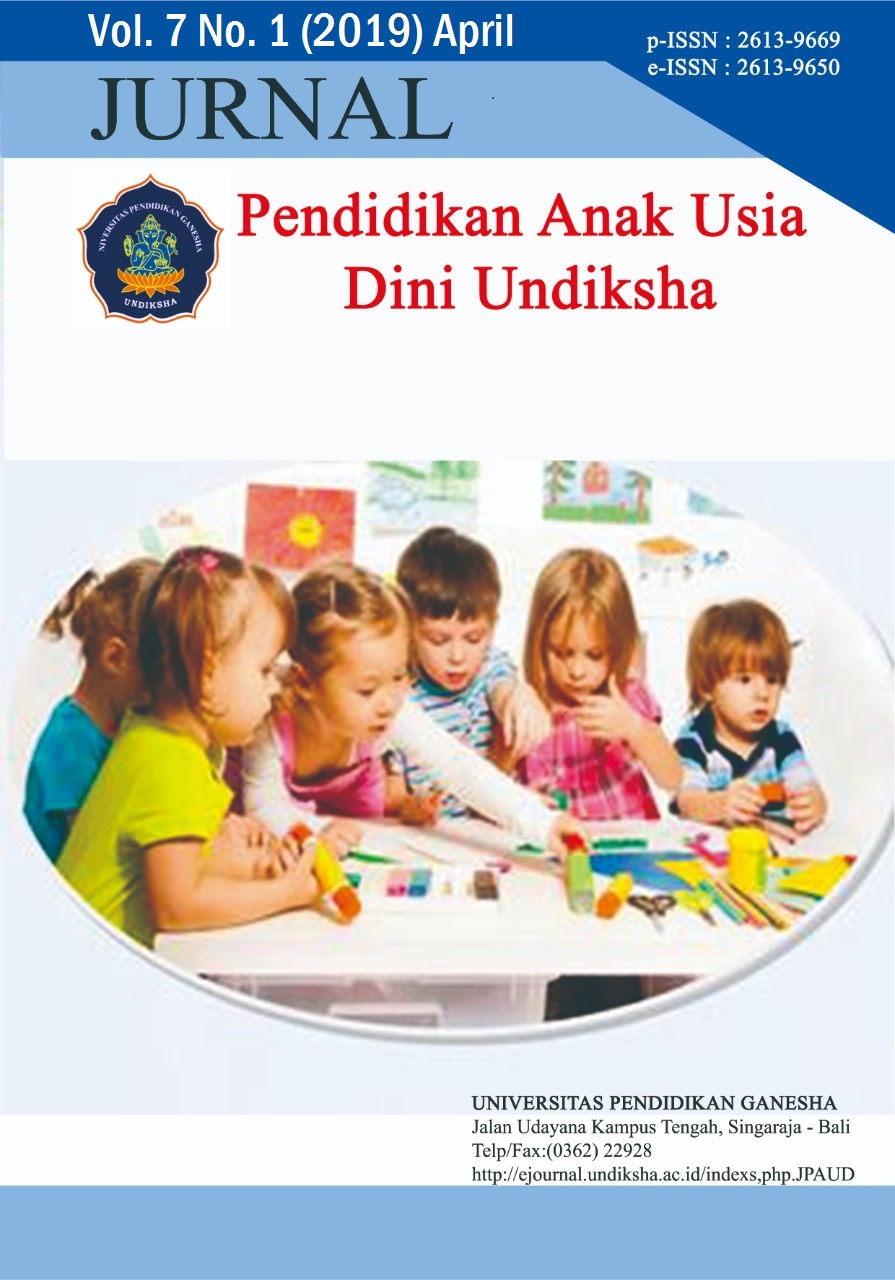EFEKTIVITAS PROGRAM PAUD INKLUSI DI KOTA DENPASAR DITINJAU DARI ASPEK KONTEKS
DOI:
https://doi.org/10.23887/paud.v7i1.18731Abstract
Penelitian ini bertujuan mendeskripsikan tentang efektivitas dari aspek konteks pada program PAUD Inklusi di Kota Denpasar. Penelitian ini termasuk jenis penelitian evaluasi yang hanya mengevaluasi aspek konteks. Populasi penelitian ini adalah seluruh sekolah PAUD yang mengimplementasikan program inklusi di wilayah Kota Denpasar. Sempel ditentukan dengan teknik purposive sampling. Sampel penelitian berjumlah 13 sekolah dengan keterangan 13 Kepala Sekolah, dan 106 guru sehingga jumlah responden pada penelitian yakni 119 orang. Pengumpulan data dalam penelitian ini menggunakan kuesioner. Data dianalisis dengan mengubah skor aspek- aspek pada variabel konteks kedalam bentuk T-skor kemudian dikonversikan dengan kuadran Glikman. Hasil dari penelitian yang dilakukan menunjukkan (1) aspek visi, misi, tujuan lembaga memiliki presentase frekuensi (+) = 42.85 % dan frekuensi (-) = 57.15 % menunjukkan hasil kurang efektif, (2) aspek program pemerintah terkait PAUD inklusi memiliki presentase frekuensi (+) = 45.38 % dan frekuensi (-) = 54.62 % menunjukkan hasil kurang efektif, (3) Lingkungan Terkait Program Pendidikan Inklusi memiliki presentase frekuensi (+) = 45.38 % dan frekuensi (-) = 54.62 % menunjukkan hasil kurang efektif. Berdasarkan hasil penelitian, dapat disimpulkan bahwa aspek-aspek pada variabel konteks termasuk kuadran IV ( - - - ) pada kuadran Glikman, sehingga implementasi variabel aspek konteks pada program PAUD inklusi di Kota Denpasar adalah tidak efektif.Kata Kunci : evaluasi program, aspek konteks, PAUD, pendidikan inklusi
This research aimed to describe the effectiveness of aspects of the context of the inclusive Early Childhood Education program in Denpasar City. This study included a type of evaluation research that only evaluated aspects of the context. The population of this research was all Early Childhood Education schools that implement inclusive programs in the Denpasar City area. The samples in the research was determined by using purposive sampling. The research sample consisted of 13 schools with information from 13 principals and 106 teachers so that the number of respondents in the study was 119 people. Data collection in this study used a questionnaire. Data were analysed by changing the scores of aspects in the context variable into a T-score then converted to Glikman quadrant. The results of the research carried out showed (1) aspects of vision, mission, objectives of the institution have the percentage of frequency (+) = 42.85% and frequency (-) = 57.15% which show less effective results, (2) aspects of government programs related to Early Childhood Education Inclusion have the percentage of frequency (+) = 45.38% and frequency (-) = 54.62% which show that the results are less effective, (3) The Environment Regarding the Inclusion Education Program has the percentage of frequency (+) = 45.38% and frequency (-) = 54.62% which shows less effective results. Based on the results of the study, it can be concluded that the aspects of the context variable are included in quadrant IV (- - -) in the Glikman quadrant, so that the implementation of the context aspect variables in the inclusion Early Childhood Education program in Denpasar City is ineffective.
keyword : program evaluation, context aspects, Early Childhood education, inclusive education
Downloads
Published
2019-07-20
How to Cite
Satya Dewi, N. P. A., ., L. A. T., & ., N. W. S. (2019). EFEKTIVITAS PROGRAM PAUD INKLUSI DI KOTA DENPASAR DITINJAU DARI ASPEK KONTEKS. Jurnal Pendidikan Anak Usia Dini Undiksha, 7(1), 1–12. https://doi.org/10.23887/paud.v7i1.18731
Issue
Section
Articles
License
Authors who publish with the Jurnal Pendidikan Anak Usia Dini Undiksha agree to the following terms:
- Authors retain copyright and grant the journal the right of first publication with the work simultaneously licensed under a Creative Commons Attribution License (CC BY-SA 4.0) that allows others to share the work with an acknowledgment of the work's authorship and initial publication in this journal.
- Authors are able to enter into separate, additional contractual arrangements for the non-exclusive distribution of the journal's published version of the work (e.g., post it to an institutional repository or publish it in a book), with an acknowledgment of its initial publication in this journal.
- Authors are permitted and encouraged to post their work online (e.g., in institutional repositories or on their website) prior to and during the submission process, as it can lead to productive exchanges, as well as earlier and greater citation of published work. (See The Effect of Open Access)











